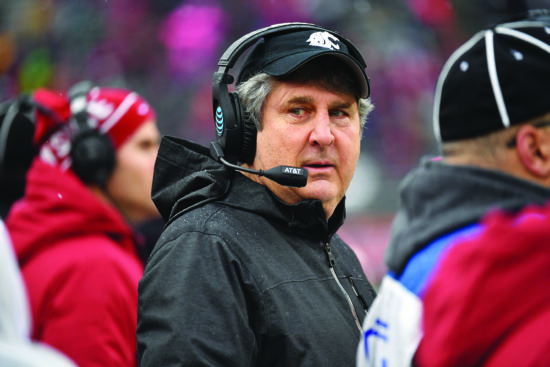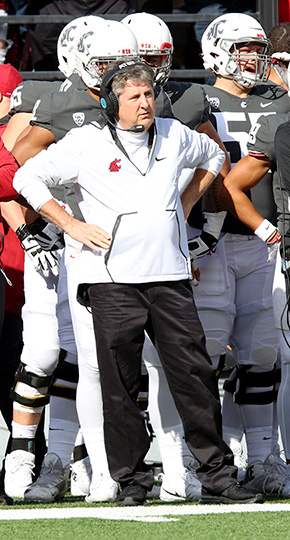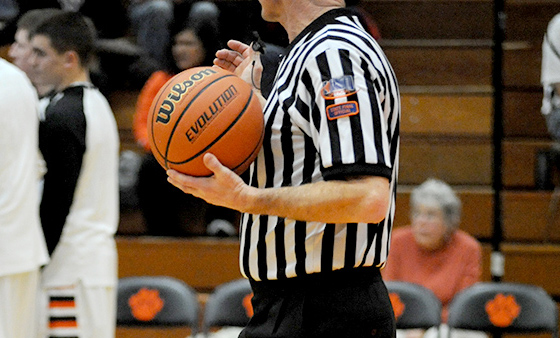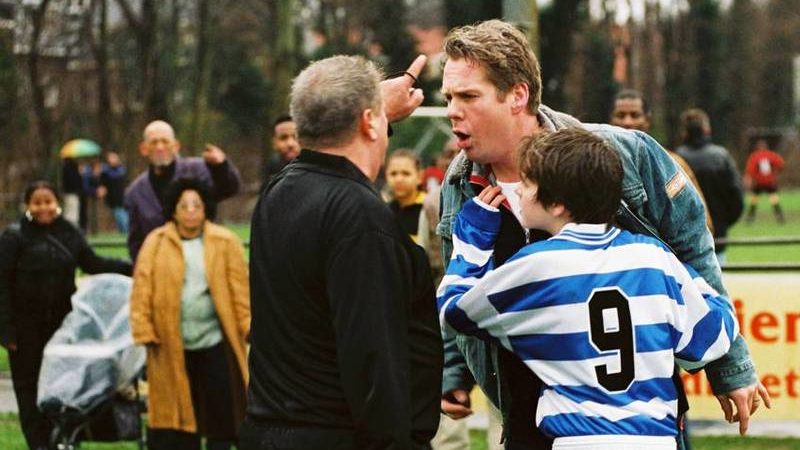Mike Leach discusses the joys, challenges of coaching

Washington State football coach Mike Leach became forever linked to swords to day he carried one into a team meeting as the head coach at Texas Tech.
As illustrated in his book, appropriately titled “Swing your Sword,” the Red Raiders had just lost two straight games, and Leach was searching for a spark. After making his entrance into the room, laying the sword and its 3-foot blade across the podium, he began to lecture the players about one of his favorite topics — pirates.
Leach’s history lesson described the brotherhood among pirates, their courage and the diversity of their crews. He finally returned to the sword, lifting it from the podium as he explained how football players should cherish their bodies the way pirates did their swords.“Your body is your sword,” Leach told his players. “Are you going to swing your sword aggressively, but really out of control like you’re out there playing street ball?… If you’re frantic, without being clear-minded, you put yourself into a vulnerable position. Are you going to duck your head and swing it timidly? Or are you going to have a great technique and swing it without any hesitation?”
That moment in 2003 followed Leach for years. The Red Raiders were labeled the “Pirate team,” and fans waved Pirate flags at games. The best part was his sword analogy worked, as Texas Tech won its next two games and ended the season by beating Navy in the Houston Bowl.
Coach & Athletic Director spoke with Leach in November, one week before his No. 14 Cougars faced No. 15 Washington in the annual Apple Cup. Here’s what he had to say about coaching, sport specialization and handling difficult parents.
You have a great interest in a lot of things and even earned your law degree. So why coaching?
I started coaching Little League when I was 14, and I did that every summer through my sophomore year in college. I really got the coaching bug there. Football was always my sport, but baseball was available to coach.
I had all kinds of summer jobs, whether it was working at the Irma Hotel (Cody, Wyoming), washing dishes or painting houses. While I’m going through all of that, I’m thinking about baseball and messing with my roster, or if I put this guy at first does that give me an extra infielder, or what can I do with my batting order?
I didn’t really have a particularly rational reason to be a lawyer, other than I figured that was what I would do. After I graduated, I didn’t want to immediately put on the suit. I was broke, owed the federal government a bunch of money in student loans, and I didn’t want to wait to coach until I got old. There was this notion to be a lawyer and then when you retire, go coach. But what if I like coaching and wish I would have done that to begin with?
I got a master’s degree at the United States Sports Academy in Daphne, Alabama, and started coaching. I figured I’d coach a year, two or three and go back to practicing law, and I’ve been coaching ever since.
In your book, you say a professor once told you in getting a law degree that you’re really getting a degree in problem solving. Do you find that your law education benefits you as a coach?
I think I use it every day, and probably in ways I’m not really conscious of. That’s the whole thing in not having enough time to get the task done, so you need to figure it out. You can’t cover it all as a coach, so you have to aggressively cover what you can and figure out what’s going to move the needle the farthest.
In football, you spend more time with preparation than anything. Then the day comes and you do brilliant things, you do dumb things, some combination of both, and you see how it comes out. And, of course, you have to recover quickly and go to the next one. I think even just as far as organizing your players and your staff, it’s helpful just because in law you’re constantly sorting issues and making choices on what to emphasize and what to pull back on.
Your first three seasons at Washington State, you compiled a 12-25 record. Over the last three season, you’re 26-11. What’s your blueprint for turning around the program?
 Everything is relative. The biggest thing is you’ve got to instill in your staff and team things like getting better every day, and not confusing activity with results. You’re practicing, watching film and lifting weights, but that doesn’t distinguish you. The whole country is doing that. You need to have the ability to draw more out of it than your opponents are in order to be successful, otherwise you’re just everybody else.
Everything is relative. The biggest thing is you’ve got to instill in your staff and team things like getting better every day, and not confusing activity with results. You’re practicing, watching film and lifting weights, but that doesn’t distinguish you. The whole country is doing that. You need to have the ability to draw more out of it than your opponents are in order to be successful, otherwise you’re just everybody else.
We try to pay a lot of attention to making the most out of what’s in the moment. Whether it’s a drill or a game, the biggest thing is doing the best you can and not cluttering your mind with things you can’t control. Attack the things you can control.
Is accomplishing that as much about culture as it is talent?
I think it’s both. Obviously, you’re better off with talent, but you’re trying to maximize every resource you have, and the one thing everybody can control is effort. Even the least talented player that you have is capable of great effort, and if you have a real talented player that’s only giving half effort, the team is cheated out of a resource it should be able to capitalize on. No matter who it is, you want to make sure you’re getting the best out of him.
You’ve talked about being a curious person, having knowledge in a variety of topics. Is that critical for a coach?
It probably helps, just to search and always check things out. You can learn something from virtually anybody. Everybody knows something or has experienced something that you haven’t.
You once said that coaches overthink the Xs/Os. Do you still think that’s the case?
Absolutely, and it’s always tempting for us to do. There are great plays all over and we want to try this or that, but it gets to the point where it’s too much. Plays are only good if you can execute them quickly, and there’s a tipping point of what you can execute as opposed to what’s more than you can execute.
You’re better off having too few plays than having too many. First and foremost, this is a game of execution, and that’s more important than fooling somebody. You’d like to fool them, but that’s not reliable. Execution is something you can count on if you make the choices of what you’re going to run and do it over and over again.
You don’t have to deal with parent problems because of limited access, but if you were a high school coach, how would you handle it?
I would tell everyone to call up (Mount Carmel, Illinois, football coach) Frank Lenti. He’d send a letter to parents at the beginning of each year and basically say we appreciate the opportunity to coach and teach your son, but we’re not going to have parents involved in playing time or coaching decisions. You’re no more qualified to evaluate your child than I would be mine. We all want them to do well.
I’d basically say if I get any calls or interference regarding playing time, I’m going to bench your kid. It’s not fair to the other kids where one guy has this whole campaign waging on his behalf. These decisions have to be made based on what we’re seeing out there on the field, and that’s the wisdom of the coaching staff. We tell our players that.
As nice and benevolent as we coaches are, we all want to win more than we’re interested in short changing some kid. Occasionally, we may be wrong, but each inch of film has been carefully watched by more than 12 people when we make these decisions, and there’s quite a bit of experience behind it. Some parent that’s rooting for their child hasn’t seen any of the film, so they’re not even qualified to make that decision.
What are your thoughts on sport specialization versus playing multiple sports?
I think they should play multiple. The more movements you do, and the more variety you have, the better it is.
I’ve had tremendous luck with soccer players, because they’re coordinated on both sides of their bodies, they have quick feet and pretty good vision. If you’re trying to track a ball down around your feet and then you’re looking higher on the football field, you’ll do well. If I was a dictator and was selfishly all about football, people would be required to play soccer through their freshman year of high school.
What general career advice do you have for high school coaches?
Like John Wooden always said, “If you want to improve the team, improve yourself.” That’s the most important thing. Also, there’s no quality more important than persistence. Be willing to do it for free, but persistence is the more important quality.
These coaches are all in a very noble profession, and it’s more than a game. It develops values in people and work ethic that carries throughout their lives. Sports is something that brings people together when they’re up and makes them happy when they’re depressed and going through hard times. It creates a shared camaraderie and brings people together in a way that transcends just being a game.
Mike Leach’s head coaching career highlights
- 122-80 (6-7 in bowl games)
- 2008 Big 12 Coach of the Year
- 2015 Pac-12 Coach of the Year
- Big 12 South Division championship (2008)
- Woody Hayes Trophy recipient (2008), given to the nation’s top college coach
- George Munger Award recipient (2008), given to the nation’s top Division I college coach
- Winningest coach in Texas Tech football history (84 wins)





